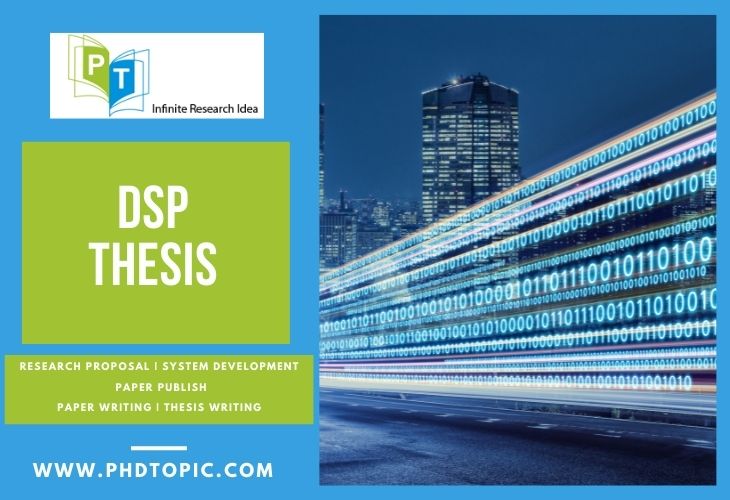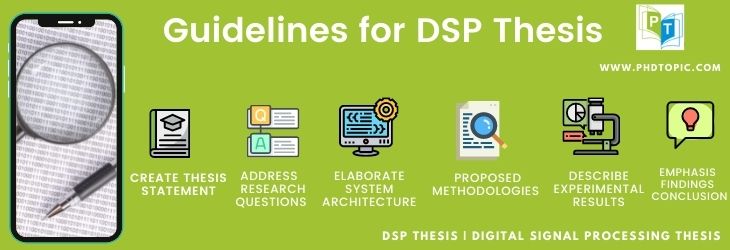This page talks about the research importance of Digital Signal Processing with its Applications and current DSP Thesis Topics. Digital Signal Processing (DSP) is the sophisticated process for analyzing digital signals to enhance their representation and understanding capability. It is one of the variants of the signal processing field. In general, the acquired or sensed real-world signals are processed in a digital signal processor through particular processing techniques. It not only executes on a digital signal processor but also in other equally capable systems.
Basic DSP Terminology
- Frequency (Hz) – Number of cycles in a second (1/period)
- Period (s) – one-cycle sine wave completion
- Amplitude –Distance between origin and peak height
A few of the DSP applications are digital image processing (DIP), audio signal processing (ASP), biomedical signal processing, digital wireless communication, biomedicine and speech recognition, and more. For instance, In the case of audio signals, DSP assists in reducing the undesired distortion and noise. Here, we have included some DSP systems in day-to-day life applications.
Examples of digital signals
- Radar Signals in Remote Sensing
- Camera Images and Broadcasted Video
- Speech can be recognized in smart phone, radio, TV and more
- Bio-signals are used in medical field (MRI / CT – brain signals and ECG – heart signals,)
Before we dive into understanding to write up DSP Thesis , Lets first understand DSP Processor. Next, we can see the essential of DSP processors in a real-world application. DSP processor is a specially designed small chip that satisfies all the DSP requirements. It widely works with all sorts of embedded systems to perform DSP operations in real-world signals. Below, we have given the benefits of using a DSP processor.
What is the use of DSP Processor in Real-World Application?
- Efficiency. Efficient in terms of cost, energy efficiency, time and etc.
- Deterministic operation. Prior accurate prediction of program execution time will assure the efficient performance
- Information. The processing of data is required to improve the signal interpretation and eliminate the unwanted signals.
- Flexibility. Accept the customizations, new updates, software modification and more without affecting regular DSP systems performance.
- Maximum throughput. Tolerate large stream data processing in ultra-speed execution. For instance: multimedia application.
- Power. Signals collected from real environment are transformed into another format which support the proposed mathematical models
- Adaptation. The data are dynamically processed where the data can increase or decrease during run-time execution. For instance: industrial application

Top 3 Limitations of DSP
Though DSP has many advantages, it has some limitations in working with complex digital systems. The Top 3 limitations of DSP are speed, finite word length, and bandwidth. Our experts have several unique DSP Thesis ideas to tackle all DSP limitations which affect the performance of the signal and System. Next, we have given the two main benefits that gain the scholar’s attention towards the signal processing field.
- Determine the meaningful data from ambient-noise filled sensed data
- By means of low computationally intensive techniques
- Efficient signal processing filtering techniques
- Energy harvesting and saving energy for physical and virtual edge devices
Further, digital signal processing is also used to analyze, filter, measure, and compress analog signals. Since it has add-on unique features such as low processing speed and low power usage, these features make the analog process use DSP for overcoming A/D conversion overheads. In this, DSP clearly removes the chaotic noise in the real-world analog signals for enhancing signal interpretation levels. For your knowledge, here we have given the primary processes involved in DSP.
Major Operations of DSP
- Acquisition of Signals – Require devices or humans to generate signal
- Detection of Noisy Signals – Detect the signals from the noisy signals
- Processing of Signals – Analyze the signal to find information in the signals
- Output of Signals – Generate the output signal after processing for further decision making
In addition, our research team has bulletined some core DSP approaches and algorithms. These below-specified techniques are largely used in many real and non-real-time DSP applications. Beyond this, we also support you in other vital methods too.
DSP Techniques and Methods
- Adaptive Filters
- Signal Management
- Wavelet Transforms
- New Object oriented System
- Source Code Generation
- Spectral Estimation
- Matlab Mathematics functions
- Spectral Analysis
- Fixed-Point and Floating-Point Design
- GUI Filter Builder
- Multistage and Multirate Filters (FIR)
- Data Management
- Filter Design and Analysis (FDATool)
- Low-pass and High-pass Filters (IIR / FIR)
- Input, Output, and Display Technologies
In order to attain the best digital signal processing topics, our researchers are tirelessly working on all current DSP project ideas. From this in-depth research, we have collected new research ideas, which are sure to create an incredible contribution to the research community. Now, let’s have a look at recent research issues in DSP in the below classifications of speech/audio, military, image processing, and instrumentation and control systems and applications.
Research Challenges in DSP
Speech/Audio
- Channel Equalization and Optimization
- Text to Speech Synthesis
- Multi-speaker Speech Recognition
- Digital Audio Signal Processing
- Efficient Speech Synthesis Techniques
Military
- Sonar Technology
- Missile Control and Guidance Systems
- Military Radar Systems
- Data Security in communication
Image Processing
- Image Animation
- Digital Pattern Recognition
- Robotic Vision: Object Tracking and Detection
- Digital Data Communication
- Image Enhancement (Contrast and Color Adjustments)
Instrumentation and Control System
- Lossless Data Compression
- RF Spectrum Analysis
- Rate and Position Control
- Noise Minimization and Measurement
So far, we have debated on the role of digital signal processing in real-world applications, DSP techniques, primary processes, and recent research challenges. Now, we can see the top-demanding DSP thesis topics in the major DSP research areas. Just for demonstration, we were given the following; beyond this, we also focus on other research areas.

DSP Thesis Topics
Massive MIMO Techniques in Communication System
- Computational Imaging
- Distributed MIMO Optimization
- Sonar and Radar Signal Processing Issues
- MIMO Channel Estimation using Compressed Sensing
- Multi Sensor Array Implication in Signal Processing
- Adaptive Beamforming and Space-Time Techniques
- Deep Neural Network based Multichannel Signal Processing
- Biological Imaging and Bioinformatics
- Advance localization and Classification Techniques for Sensor network
- Arrayed Synthetic Aperture Radar Imaging Applications
- Direction of Arrival Estimation and Localization in GPS
- Biomedical Signal Processing and Diagnosis
- Sensor Systems for Image and Biosignal Processing
- Wireless Sensor Distributed Signal Processing based on Gossip Algorithm
Multimedia Signal Processing
- Advances in Multimedia Signal Processing
- Secure Privacy-Preserving Distributed Signal Processing Models
- Image / Audio Steganalysis and Steganography
- Learning Techniques for Multimedia Forensics Security
- Digital Hybrid Watermarking (Attack, Theory, Techniques)
- Content Authentication using Multimedia Hashing
Multirate Digital Signal Processing
- Signal Sampling, Interpolation and Extrapolation
- Time-Frequency Representations and Analysis
- Graph-Wavelet based Spectral Graph Theory and Analysis
- Fast Computation and Transforms Approaches for DSP
- Distributed Approach for Sparse Signal Processing and Recovery
- Real-time Digital Filter Design, Analysis and Simulation
- Algebraic and Geometric Topology for Signal Processing
- Multirate Filter Banks and Wavelets in Signal Processing
- Signal Sampling and Processing with Finite Rate of Innovation
Applications of Signal Processing
- GPS Navigation
- Autonomous In-Vehicle Systems
- Cyber-Physical Microsensor Systems
- Smart Grid and Power Systems
- And Other Internet of Things and Sensor Applications
- Modern Machine Communication Systems
Signal Processing in Wireless Communications
- Wireless Ad Hoc and Sensor Networks
- Energy Aware Wireless Communications Protocols
- Space-Frequency/Time Block Code for MIMO Signal Processing
- Source Coding and Compression
- Signal Detection and Reception Techniques for Digital Communication
- Adaptive Spread Spectrum for Ultra Wideband Communication
- Resource Queuing systems in Wireless Network
- Signal Processing based on Joint Source-Channel Decode Schemes
- Channel Characterization and Estimation Modeling
- Distributed Code Computing and Communication
- Precoding design for Massive MIMO
- Cross-Layer Architecture Design and Communication
- Game Theoretic Applications for Social Networks
- Communication Network Model Performance Evaluation
- Multicarrier Spread Spectrum in DSL and OFDM Models
- Multiple Access Control in Cognitive Radios Networks (CRNs)
- Network Coding for Two-Way Relay Channels Communications
- Optimal Physical Layer Communication Security for Multiuser Systems
Further, our developers have given some significant tools, languages, resources, visualization software, and editing tools for signal processing and analysis. Choosing the right tool also plays the main role in research development.
Tools for Signal Processing and Analysis
- Languages: Octave and Matlab
- Java enabled Resources: Tritonous and Java Sound
- Signal Visualization Software: GraphCalc
- Audio Editing Tools: Audacity and ACORNS Sound Editor
Next, our writer team has given you the list of things that we follow in creating the “best DSP Thesis.” These below-specified matters are surely included in your thesis with detailed and crisp information. Further, we also proofreaders to revise the thesis until we reach absolute thesis content.
Guidelines for DSP Thesis Writing
- Create the thesis statement
- Address the Research questions with research aim/objective
- Elaborate the System Architecture
- Define the Dataset and Sample size
- Describe the Proposed Methodologies (Algorithms and Techniques)
- Discuss the Experimental Results and Limitation
- Emphasis the Findings in Conclusion
- Suggest the Future Study
On the whole, we support you in research, code development, paper writing, paper publication, and DSP thesis writing of digital signal processing. So, contact us to avail all these services in one place with the best guidance.
